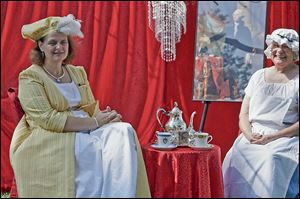
Frontier’s feminine side saluted
Park event honors ladies of Frenchtown
4/15/2013
Rebecca Roper, left, and Judy French Lowell re-enact a tea of 19th century Frenchtown at the River Raisin National Battlefield Park in Monroe. A period tea will be held at the park on Saturday.
MONROE — Men of the War of 1812 era have received plenty of attention from historians and re-enactors, but what about women? They too endured great hardship and danger. The River Raisin National Battlefield Park wants to fill in the record.
On Saturday, it will hold Women’s History Day and Tea, an event dedicated to the female side of the early 19th century society in what then was Frenchtown.
The activities are to run from noon to 4 p.m. and are to include stories about and re-enactments of the brave females of Frenchtown and what their lives were like two centuries ago. A tea that would be hosted by ladies of the period is to be held. Admission is free.
Shawna Mazur, a park ranger, said advance feedback has been strong, and the park hopes to have an annual event dedicated to Frenchtown women’s history. “This is an aspect of our history here that has not been looked at,” she said.
Sandy Vanisacker, the park volunteer who has been putting the event together since January, said it’s about time that women were recognized for the indispensable contributions they made to Frenchtown society.
“The militia that did the fighting is always prominently featured in histories,” Ms. Vanisacker said. “There has been plenty written about the men who fired the cannon and the muskets. Nobody ever talks about the heroism of the women during this time. Women in those days had 12 to 20 children. In addition to caring for the children, they also maintained the gardens and made candles and food from scratch. They did everything. They supported their men and made uniforms and helped defend their homes.”
Ms. Vanisacker of Monroe recalls the childhood stories told to her by her late mother about her ancestors from that time.
“I’m actually a descendant of several settlers in the community,” Ms. Vanisacker said. “My ancestors had five plots in the settlement. When I was a child, my mom would tell me that our ancestors were here, along the River Raisin.”
She said her interest in the history of Frenchtown intensified when the national park was formed in 2010, and she has been a dedicated volunteer ever since. Also inspiring to her was the book Women on the Raisin, written by Michigan historian Mary Ellen Van Wasshenova, who will be at the history event to sign books and speak at noon.
Ms. Van Wasshenova of Monroe said the women of the War of 1812 were “silent soldiers. They had their own little war that they were fighting.”
Horticulturist Cheri Maitland is set at 2 p.m. to discuss the native herbs and plants of Frenchtown and how the settlers used them medicinally. Panoka Walker is to discuss the same subject from the perspective of the Native Americans of the era.
Herbalist Sara Christianson is to offer teas made from indigenous plants grown in the visitor center gardens, and two custom-made teas — River Raisin and Major Muskrat — are to be introduced. The second tea is named for the park’s mascot.
Ongoing period-craft demonstrations will include lace-making, quilting, weaving, and knitting. Beading professional Joan Pashanian will show how Frenchtown women used the chatelaine, a decorative clasp that carried such essential tools as scissors, thimbles, and keys, and Gayle Simmons is to have a display of women’s clothing.